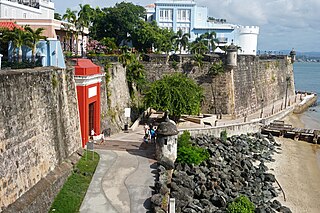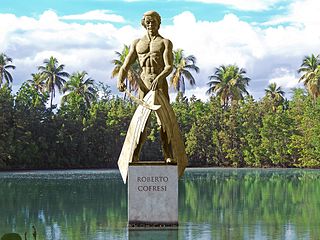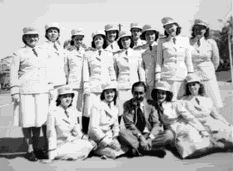
The Dominican Republic is a country on the island of Hispaniola in the Greater Antilles archipelago of the Caribbean Sea, bordered by the Atlantic Ocean to the north. It occupies the eastern five-eighths of the island, which it shares with Haiti, making Hispaniola one of only two Caribbean islands, along with Saint Martin, that is shared by two sovereign states. It is the second-largest nation in the Antilles by area at 48,671 square kilometers (18,792 sq mi), and second-largest by population, with approximately 11.4 million people in 2024, of whom approximately 3.6 million live in the metropolitan area of Santo Domingo, the capital city.
March 1 is the 60th day of the year in the Gregorian calendar; 305 days remain until the end of the year.

Puerto Rico, officially the Commonwealth of Puerto Rico, is a Caribbean island, Commonwealth, and unincorporated territory of the United States. It is located in the northeast Caribbean Sea, approximately 1,000 miles (1,600 km) southeast of Miami, Florida, between the Dominican Republic and the U.S. Virgin Islands, and includes the eponymous main island and several smaller islands, such as Mona, Culebra, and Vieques. With roughly 3.2 million residents, it is divided into 78 municipalities, of which the most populous is the capital municipality of San Juan. Spanish and English are the official languages of the executive branch of government, though Spanish predominates.

1954 (MCMLIV) was a common year starting on Friday of the Gregorian calendar, the 1954th year of the Common Era (CE) and Anno Domini (AD) designations, the 954th year of the 2nd millennium, the 54th year of the 20th century, and the 5th year of the 1950s decade.

San Juan is the capital city and most populous municipality in the Commonwealth of Puerto Rico, an unincorporated territory of the United States. As of the 2020 census, it is the 57th-largest city under the jurisdiction of the United States, with a population of 342,259. San Juan was founded by Spanish colonists in 1521, who called it Ciudad de Puerto Rico.
The year 1967 in film involved some significant events. It is widely considered one of the most ground-breaking years in American cinema, with "revolutionary" films highlighting the shift towards forward thinking European standards at the time, including: Bonnie and Clyde, The Graduate, Guess Who's Coming to Dinner, Cool Hand Luke, The Dirty Dozen, In Cold Blood, In the Heat of the Night, The Jungle Book and You Only Live Twice.
The year 1953 in film involved some significant events.

Roberto Cofresí y Ramírez de Arellano, better known as Pirata Cofresí, was a pirate from Puerto Rico. He was born into a noble family, but the political and economic difficulties faced by the island as a colony of the Spanish Empire during the Latin American wars of independence meant that his household was poor. Cofresí worked at sea from an early age which familiarized him with the region's geography, but it provided only a modest salary, and he eventually decided to abandon the sailor's life and became a pirate. He had previous links to land-based criminal activities, but the reason for Cofresí's change of vocation is unknown; historians speculate that he may have worked as a privateer aboard El Scipión, a ship owned by one of his cousins.

Plaza Las Américas is a shopping mall in Hato Rey, San Juan, Puerto Rico, located at the intersection of Routes 18 and 22. "Plaza", as it is known to many Puerto Ricans, was the first indoor shopping mall built in Puerto Rico. It is the largest shopping mall in the Caribbean and the second largest in Latin America. Anchor stores are JCPenney, Macy's, Sears, Sears Brand Central, Forever 21, Old Navy, Caribbean Cinemas and Marshalls. Previously, there was a Kmart store near the mall.

Old San Juan is a historic district located at the "northwest triangle" of the islet of San Juan in San Juan. Its area roughly correlates to the Ballajá, Catedral, Marina, Mercado, San Cristóbal, and San Francisco sub-barrios (sub-districts) of barrio San Juan Antiguo in the municipality of San Juan, Puerto Rico. Old San Juan is the oldest settlement within Puerto Rico and the historic colonial district of the city of San Juan. This historic district is a National Historic Landmark District named Zona Histórica de San Juan and is listed on the United States National Register of Historic Places as the Old San Juan Historic District. Several historical buildings and structures, particularly La Fortaleza, the city walls, and El Morro and San Cristóbal castles, have been inscribed in the UNESCO World Heritage Site list since 1983. Historically the mixed-use commercial and residential real estate in the main streets of Calle Cristo and Calle Fortaleza from Calle Tanca to the Governor’s Mansion is the most valuable in the area and it has kept its value and increased steadily through several years despite the past economic turmoils.

Hispanic and Latino Americans are Americans of Spanish and/or Latin American ancestry. These demographics include all Americans who identify as Hispanic or Latino regardless of ancestry. As of 2020, the Census Bureau estimated that there were almost 65.3 million Hispanics and Latinos living in the United States and its territories.

The recorded military history of Puerto Rico encompasses the period from the 16th century, when Spanish conquistadores battled native Taínos in the rebellion of 1511, to the present employment of Puerto Ricans in the United States Armed Forces in the military campaigns in Afghanistan and Iraq.

James Ellison was an American film actor who appeared in nearly 70 films from 1932 to 1962.
Hispanics in the United States Marine Corps, such as Private France Silva who during the Boxer Rebellion became the first Marine of the thirteen Marines of Latin American descent to be awarded the Medal of Honor, and Private First Class Guy Gabaldon who is credited with capturing over 1,000 enemy soldiers and civilians during World War II, have distinguished themselves in combat. Hispanics have participated as members of the United States Marine Corps in the Boxer Rebellion, World War I, the American intervention in Latin America also known as the Banana Wars, World War II, the Korean War, the Vietnam War, the Gulf War and most recently in the military campaigns of Afghanistan and Iraq.

The 55th Annual Grammy Awards were held on February 10, 2013, at the Staples Center in Los Angeles honoring the best in music for the recording year beginning October 1, 2011 through September 30, 2012. The show was broadcast on CBS at 8 p.m. ET/PT and was hosted for the second time by LL Cool J. The "Pre-Telecast Ceremony" was streamed live from LA's Nokia Theater at the official Grammy website. Nominations were announced on December 5, 2012, on prime-time television as part of "The GRAMMY Nominations Concert Live! – Countdown to Music's Biggest Night", a one-hour special co-hosted by LL Cool J & Taylor Swift and broadcast live on CBS from the Bridgestone Arena in Nashville, Tennessee. Fun, Frank Ocean, Mumford & Sons, Jay-Z, Kanye West and Dan Auerbach received the most nominations with six each.

The following events occurred in November 1964:

Protests began in cities throughout Haiti on 7 July 2018 in response to increased fuel prices. Over time, these protests evolved into demands for the resignation of Jovenel Moïse, the then-president of Haiti. Led by opposition politician Jean-Charles Moïse, protesters stated that their goals were to create a transitional government, provide social programs, and prosecute allegedly corrupt officials. From 2019 to 2021, there were massive protests calling for the Jovenel Moïse government to resign. Moïse had come in first in the 2016 presidential election, for which voter turnout was 21%. The 2015 elections had been annulled due to fraud. On 7 February 2021, supporters of the opposition allegedly attempted a coup d'état, leading to 23 arrests, as well as clashes between protestors and police.













